17 Prepositions In Arabic With Meanings And Examples
In Arabic grammar, prepositions are words that link a noun to the rest of the sentence. They usually tell you about time, place and direction. Examples of prepositions in Arabic include إِلَىٰ, مِنْ, عَلَىٰ, فِي, but there are many more. There are also those little words that you don’t even notice you’re using, but which completely change the meaning of the sentence.
Advertisements
In Arabic, using prepositions is more complicated because of Arabic’s case system. The thing about Arabic prepositions is that they affect the case of the noun that follows them.
How To Say Prepositions In Arabic
A preposition is called حَرْفُ الْجَرِّ pronounced as harf ul ĵarr in Arabic language. It is a single letter or a word which connects two nouns, or a noun and a verb to form a sentence. Arabic preposition always precedes a word and never follows the word.
How Many Prepositions Are There?
There are seventeen (17) prepositions in Arabic grammar. These seventeen are divided into attached and detached prepositions.
Read also What’s That In Arabic, Examples And How To Say It.
Advertisements
Arabic Prepositions List
Arabic prepositions are:
- from, of, than مِنْ min
- up to, to, at إلى ilaa
- about, on behalf of, away from عَنْ an
- above, on, upon عَلى alaa
- in, at, with في fii
- with, by, in بِ bi
- like, such as كَ ka
- to, for لِ li
The Detached prepositions
These propositions are not connected to the word that follows them. They stand by themselves.
| Arabic Prepositions | English Meaning |
| في | in, at, with |
| عَلى | above, on, upon |
| عَنْ | about, on behalf of, away from |
| إلى | up to, to, at |
| مِنْ | from, of, than |
The Attached Prepositions In Arabic
There are three attached prepositions in Arabic. They are letters of the Arabic alphabet and cling to the word that follows them.
| Arabic Attached Prepositions | English Meaning |
| كَ | like, such as |
| لِ | to, for |
| بِ | with, by, in |
How Do Prepositions Work In Arabic?
Arabic prepositions always come before a noun and pronouns and it does not come before a verb. The noun following a preposition is changed from nominative case to genitive case. This means that the last letter of the word will be changed from a /dammah/ or /đammatain/ to a /kasrah/ or /kasratain/.
This means that if the preposition precedes the indefinite noun, the last letter of this noun changes from two dammahs to two kasrahs (example: عً – عٍ ). If it precedes the definitive noun it analogously changes from dammah to kasrah (عُ -> عِ ).
Advertisements
The noun following a preposition is called مَجْرُورٌ (Maĵrūr) which means the preposition has caused a change in its case (from nominative to genitive case).
How To Find Prepositions In Arabic
Propositions can follow nouns and link them to the remainder of a sentence, but they can never end a sentence (as they can in English). They are usually placed in front of nouns or pronouns to indicate a relationship between that noun/pronoun and a verb, adjective, or noun that precedes it.
Additionally, in the case of Arabic grammar, they are simple when conjugating them with pronouns. Arabic preposition particles are Mabni words, which means that they mostly have a fixed pronunciation regardless of their position in the sentence.
Advertisements
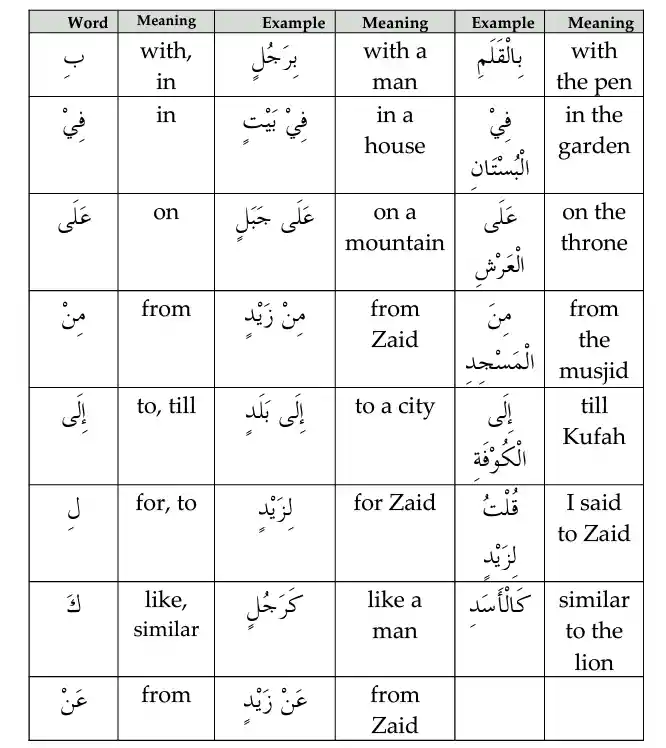
Examples Of Common Arabic Prepositions
1. إلى /ilaa/ up to, to, at
The preposition “إلى“ in Arabic translates to both “to” and “at”. Is one of the most commonly used prepositions in the Arabic language and can be used in a wide variety of grammatical constructions and expressions.
Examples are;
- The train arrived at (got to) the station. وصلَ القطارُ إلى المحطةِ
- I walked from the mountain to the sea. ﺫَﻫَﺒﺖُ ﻣِﻦ ﺍَﻟﺠَﺒَﻞِ ﺇِﻟَﻰ ﺍَﻟﺒَﺤﺮِ
- To the door إِلَىٰ الْبَابِ
2. مِــن /Miin/ From, Some of or One of
The prepositions مِــن refers to initiating an action from some place, or it can mean than “some of”. It can also refer to the gender or species meaning “one of”.
Example:
- From a house مِنْ بَيْتٍ
- From the school ِمن المدرسة
- From the school من المسجدِ
3. الباء / بِ / /Ba, or simply Bi/ By, With, In or At
In Arabic, بِ preposition means with, by or in. It one of the most commonly used prepositions in the language.
Examples:
- I ate with a spoon. أكلت بالملعقة
- I write with a pen. ﺃَﻛﺘُﺐُ ﺑِﺎَﻟﻘَﻠَﻢِ
- Coffee with milk ﻗَﻬﻮَﺓٌ ﺑِﺎَﻟﺤَﻠِﻴﺐِ
4. في /fee/ In or Into
The “في“ translates to “in”, and more specifically “into or at”.
Examples:
- He worked in a factory. ﻋَﻤِﻞَ ﻓِﻲ ﻣَﺼﻨَﻊٍ
- The boy is in the garden. اَلْوَلَدُ فِي البُسْتَانِ
- The students are in the classroom. الطلابِ في الفصلِ
5. على /Aala/ On or Above
The preposition “على” means on, on top of, above, or upon.
- The key is on the book. المِفْتَاحُ عَلَىٰ الْكِتَابِ
- The lion is on a rock. الأَسَدُ عَلَىٰ صَخْرٍ
- The book is on the desk. الكتابُ على المكتبِ
6. عـَـن /Aan/ From or About
The عـَـن preposition means about, on behalf of, away from something or someone.
Example:
- He talked about the weather. ﺗَﺤَﺪَّﺙَ ﻋَﻦ ﺍَﻟﻄَّﻘﺲِ
- The village is located far from the capital. ﺗَﻘَﻊُ ﺍَﻟﻘَﺮﻳَﺔُ ﺑَﻌِﻴﺪﺍً ﻋَﻦ ﺍَﻟﻌَﺎﺻِﻤَﺔِ
- I read a book about love. قرأتُ كتاباً عـن حب
7. الكاف / ك/Ka / Like or As
The preposition ك can be translated to as or like. It is often used in comparisons.
Example:
- False hopes are like a mirage. الأمانيُّ الخادعةُ كالسرابِ
- Time is like a sword. الوقت كالسيف
- The train is fast like the lightning. ﺍَﻟﻘِﻄَﺎﺭُ ﺳَﺮِﻳﻊٌ ﻛَﺎَﻟﺒَﺮﻕِ
8. اللام /li/ To or For
The preposition لِ can be translated to for or to. This preposition can refer to the reason or the possession.
Example:
- I gave the twig to the rabbit. ﺃَﻋﻄَﻴﺖُ ﺍَﻟﻐُﺼﻦَ ﻟِﻠﺄَﺭﻧَﺐِ
- Students go to school to learn (for learning). يذهب الطلابُ للمدرسةِ للتعلمِ
- Success is for the hard-working. النجاحُ لِلمجتهدين
Prepositional Phrase in Arabic
Some of the examples of prepositional phrase in Arabic are:
Examples with the preposition min مِنْ
- مِنْ قَبْلِ [min qabli] – before
- أكْثَرُ مِنْ – [aktharu min] – more than
- مِنْ ثَمَّ [min thamma] – therefore, thus
- مِنْ غَيْرِ [min ghayri] – without
Examples with the preposition ilaa إلى
- إلى أَنْ [ilaa an] – untill, till
- إلى الغَدِ [ilal ghadi] – till tomorrow
- إلى مَتى [ilaa mataa] – till when
- إلى الأمامِ [ilal amaami] – forward, ahead
- إلى الأَبَدِ [ilal abadi] – forever
Examples with the preposition 3an عَنْ
- عَنْ قَليلٍ – next [an qaliilin]
- عنْ حَقٍّ – rightly [3aan haqqin]
Examples with the preposition 3alaa عَلى
- عَلى سَبيلِ المِثالِ – for example [3alaa sabiilil mithaali]
- عَلى كُلِّ حالٍ – anyway [3alaa kulli Haalin]
Examples with the preposition fii في
- في ساعَةٍ [fii saa3atin] – in an hour
- في المَساءِ [fil masaa’i] – in the evening
- في الصَّباحِ [fiS-SabaaHi] – in the morning
Arabic Prepositions With Pronouns
In Arabic, prepositions can attach to the attached pronouns and form a paradigm. Hereunder, follow examples of the prepositions attached to the pronouns in the photo below.
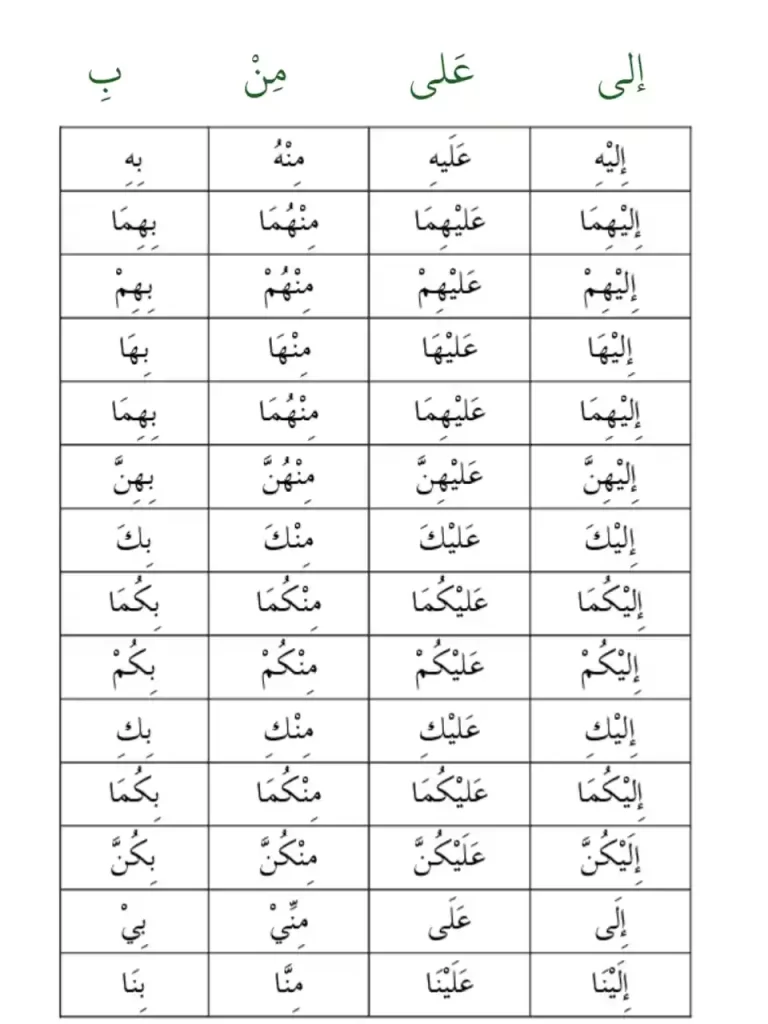
Conclusion
Arabic prepositions are not the same as English prepositions. Prepositions are called Huruufu l-jarr, that can be translated to genitive particles. Note that not all English prepositions are included in the Arabic Huruufu l-jarr.
Words like before and during belong to Zarfu z-zamaan while words like above and below belong to the Zarfu l-makaan. Zarfu z-zamaan and Zarfu l-makaan can be translated to adverbs of time and adverbs of place.
Advertisements

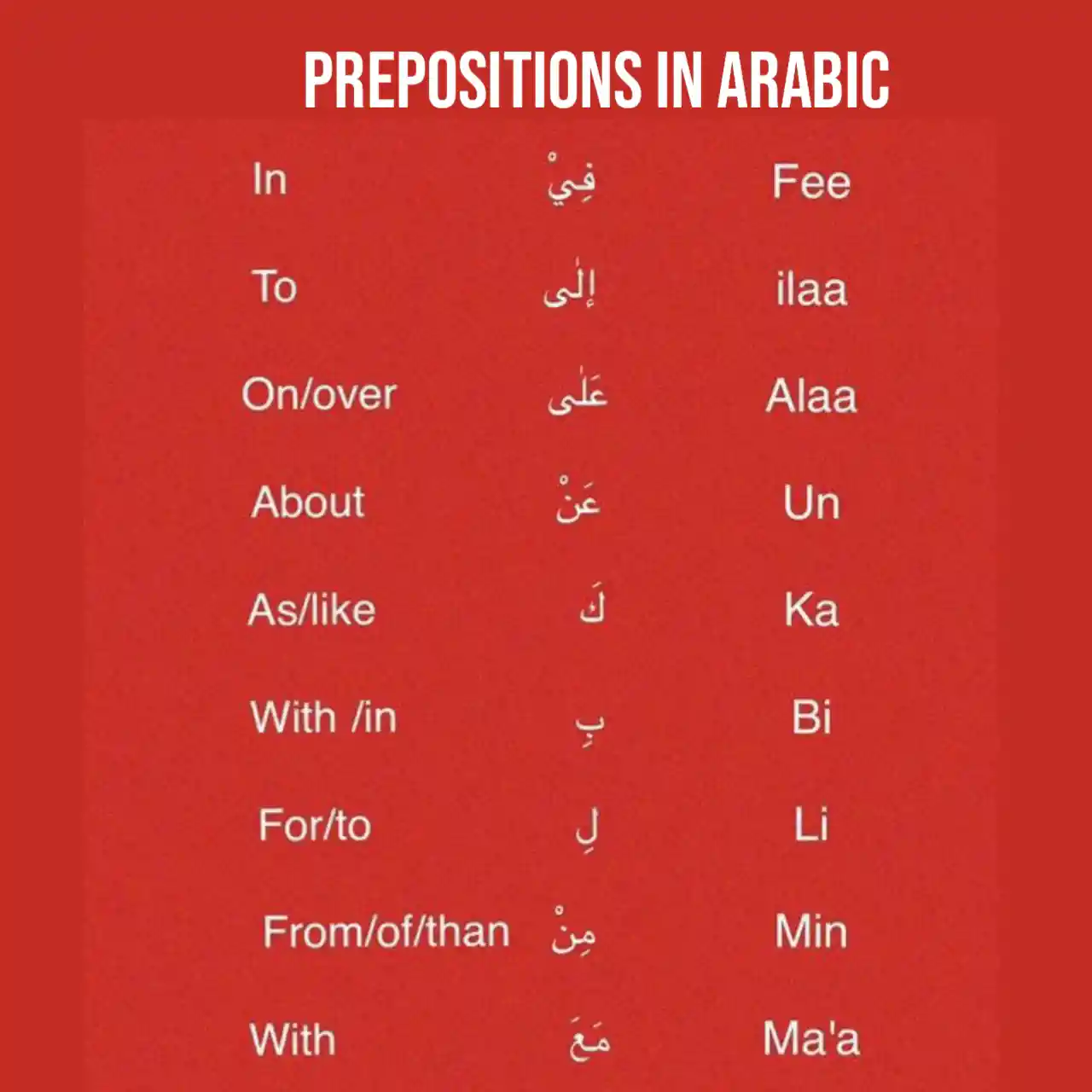

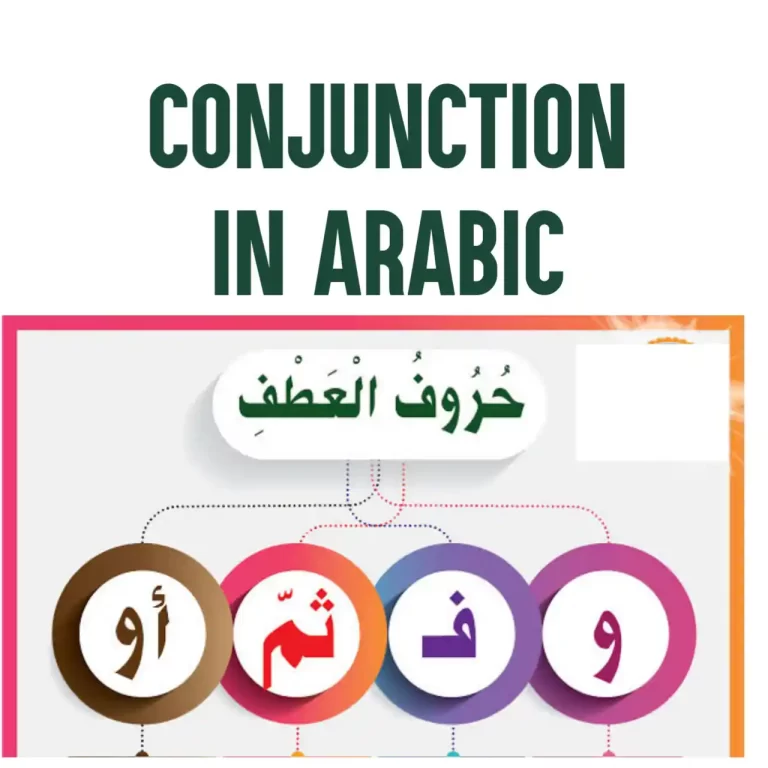



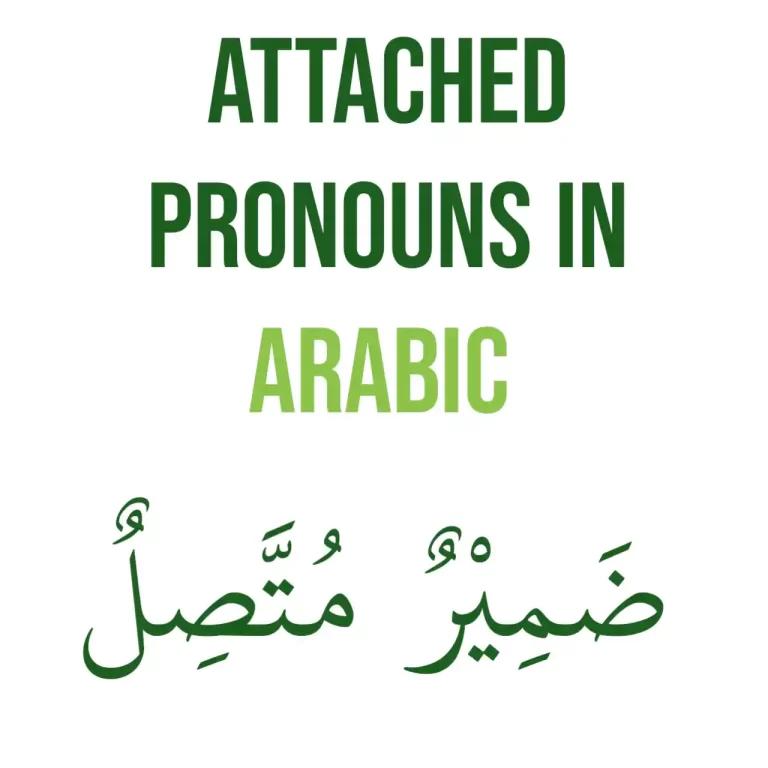
One Comment